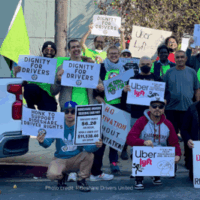Susie Young is a home care worker and a member of SEIU 775 in Washington State.
I started doing home care work in the late 80s. Now, all home care workers in Washington State have employee rights and protections, but back then if you didn’t work for an agency you weren’t considered a direct employee and you were all on your own with zero protections.
Even working for an agency, we had few protections. I worked with HIV clients during the height of the AIDS epidemic, but we had to fight for basic PPE, even just a box of gloves.
Back then, if my car broke down on the way to a client or if I got injured on the job, I was all on my own. We paid for everything out of pocket – gas, car maintenance, healthcare. Many of my colleagues were on food stamps.
At one point, I injured my back at work. I had health insurance through my husband so I was able to get physical therapy. But I had a friend who broke her back at work and ended up in the hospital and lost her house because she didn’t have health insurance.
In 2001, legislators passed ballot initiative 775 and home care workers finally won employee rights for all home care workers in Washington State with workplace protections like unemployment benefits, workers compensation, and the right to union representation.
That was the start of our union! And it meant that no home care worker would ever be on their own again, like I was, without any safety-net or collective voice.
However, my first encounter with a union was when I was working at the agency. I’m a union leader and Executive Board member now, but back then I voted against joining our union because of these black and white anti-union films our agency made us watch at the office. Can you believe that?
We got paid with Medicaid dollars to watch those films. When we left the office, we walked down the hallway and dropped our ballots in the box. I voted “no”.
That union drive failed. But, as time went on, I saw that we still had to fight for every little thing. We had a petition to get reimbursed for gas mileage, but the agency refused to budge. We kept fighting for gloves and the agency refused to provide them.
The agency I worked for was part of a national company that SEIU went on to win a neutrality agreement with them – meaning that they couldn’t make us watch those anti-union films anymore or fire us for supporting our union. So this time around I said “come on, girls, it’s time to join a union.” And we did!
Being a part of our union was like having dark clouds cleared from the sky. We finally started getting respect.
We joined our union in 2003. We were a tiny, scrappy union local back then. We had no money but we had the will to fight. And now we’ve built political power and a strong voice in Washington State.
It has been a fight but I’m proud of our persistence as a union – we got where we are today because we never gave up. We organized to win training standards for home care workers in our state.
When I first started there was zero training to be a home care worker. Even line cooks get training, but we had to take care of people without any training. We’d be given just a name and an address and told to show up.
We fought for better wages, and health insurance, and eventually we won a retirement plan for home care workers. We were the first home care union to win a retirement plan in the nation.
Our number one goal was to lift home care workers out of poverty and we’ve helped so many caregivers achieve that. We’re not rich but we have a decent wage and we’ve come a really long way.
Our union gave us a voice to tell our stories, and we learned who we needed to share those stories with to make real improvements in our lives. We are digging ourselves out of poverty and we’ve built respect for our profession.
Now, these big lobby groups like the Coalition for Workforce Innovation are trying to take us backwards. We’ve fought too long and too hard to go back. The dignity of our work would be taken away from us if home care workers lost employee rights.
If you take those things away from us, you also hurt our clients. We should be improving and strengthening worker rights, never going backwards. And no other group of workers should be pushed backwards, either.
This thing they call innovation is a way of going backwards. I don’t think we can allow that. It took 50 years for home care workers to win labor protections, which gave us the right to workers compensation and minimum wage and overtime — but there are still workers out there who are not protected by labor law. If you’re a worker, you deserve labor protections. Period.


